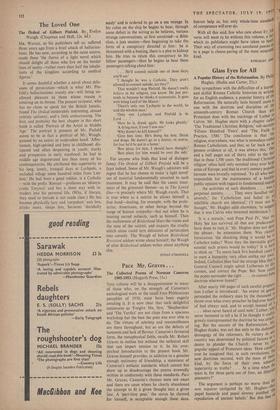Pace Mr. Graves ...
THIS volume will be a disappointment to many of those who, on the strength of Cameron's anthologised work or the small Fore Phblications pamphlet of 1950, must have been eagerly awaiting it. It is now clear that such delightful miniatures as 'Forgive Me, Sire,' Shepherdess' and 'The Verdict' are not chips from a spacious workshop but the best the poet was ever able to do. The virtues of sobriety and reasonableness are there throughout, but so are the defects of tameness and lack of flavour. Cameron's favoured form, the metaphysical fable, recalls Mr. Robert Graves in outline but without the technical skill that can impart tension to it. In his over- pitched Introduction to the present book Mr. Graves himself provides, in addition to a genuine enough testimony of friendship, a statement of Cameron's esthetic standards which cannot but show up to disadvantage the poems avowedly written in conformity with these standards. Pace Mr. Graves, Cameron's rhymes were not exact and there are cases where he clearly abandoned the attempt to fit a given thought into a given line. A 'part-time poet,' the status he claimed for himself, is acceptable enough these days, heaven help us, but only whole-time standards of competence will ever do.
With all this said, few who care about Er;lisb, verse will want to be without this volume, a lac' which its publishers might have taken to halt Their way of cramming two unrelated poems 00 to a page is cheese-paring of the most miserable kind.
KINGSLEY AMIS














































 Previous page
Previous page